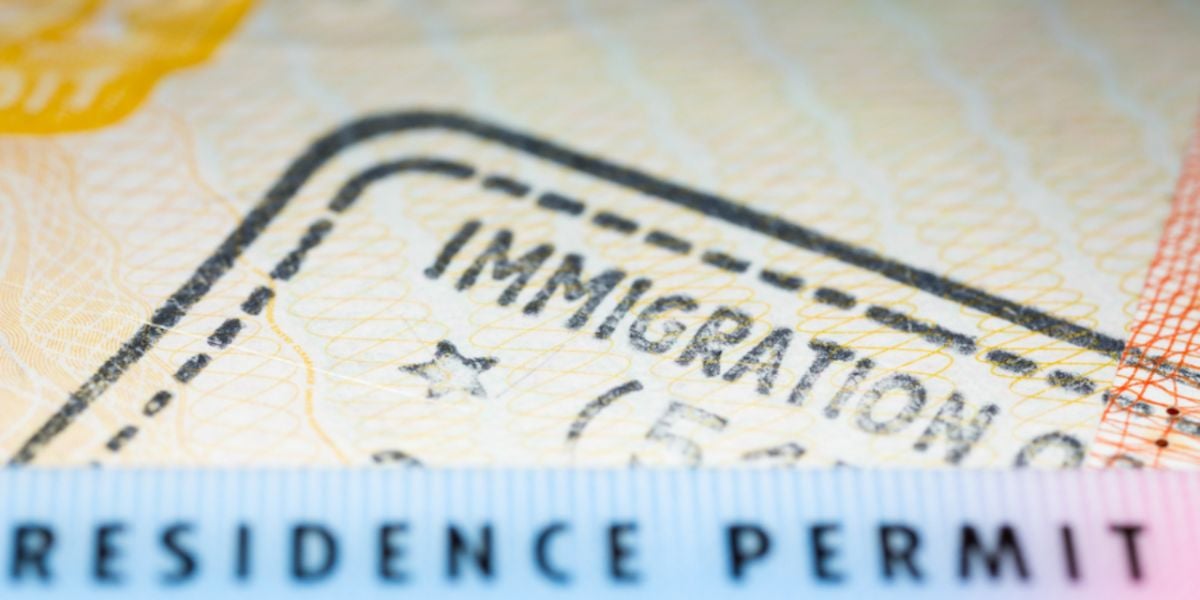
Settling in England (or anywhere in the UK) opens doors to numerous opportunities for expatriates. It allows you to participate in the labour market, pursue further studies and access essential benefits like the country's free healthcare system. This means you can work, study and live in England with the peace of mind that comes from knowing you have the support and advantages available to integrate fully into British society.
Indefinite leave to remain (ILR) in England
Indefinite leave to remain (ILR, for short) in England and the UK allows you to live, work (including self-employment), study and access the NHS - along with other potential benefits, like the UK State Pension.
To be eligible for ILR, you must have lived in England continuously for at least five years (or in exceptional cases, three years) with only short-term absences.
Acquiring the ILR is the initial stage of applying for British citizenship. The way to reach indefinite leave to remain is via one of the immigration visas (eg Skilled Worker visa).
Depending on the visa you were on, you may also need to meet salary or financial requirements. Part of your application for indefinite leave to remain will be an English language and a 45-minute Life in the UK test. You can then apply for British citizenship after one year of obtaining indefinite leave to remain.
If you have a child in England while you are settled, the child will become a British citizen at birth. This is one of the biggest advantages of achieving settled status here. Once settled in England, you'll receive receive a Biometric Residence Permit (BRP), which will state the following information:
- Your immigration status (eg indefinite leave to remain or enter, no time limit);
- Your name, date and place of birth;
- Your fingerprints;
- And a passport-sized photo.
Usually there's a print of your National Insurance (NI) number at the back of the permit, too. Although, BRPs are being phased out by the government as the immigration system moves to a fully digital approach (more on this later).
Important:
If your BRP is stolen or lost, you must report the theft or loss to the police and the Home Office for it to be cancelled. If you're abroad, you will be issued a short-term, single-entry visa to return to England. You can then update, replace or transfer your BRP via GOV.UK.
EU Settlement Scheme in England and the UK
The EU Settlement Scheme remains active for specific circumstances in 2025, though the main deadline passed on 30 June 2021. This scheme was created to protect the rights of EU, EEA and Swiss citizens and their families who were living in England before Brexit.
Understanding who can still apply and under what circumstances is important for expats who may have missed the original deadline or find themselves in changing personal situations.
Who can still apply
You can still apply to the EU Settlement Scheme if you have a deadline after 30 June 2021.
Most people had to apply by this original date, but some have a later personal deadline - this can happen if you came to England after that date to join a family member with settled or pre-settled status, if you were born or adopted after the deadline, or if you became eligible later due to a visa or relationship change.
You can also still apply if you missed the deadline but have a good reason, like illness or not knowing you needed to apply. In these cases, the deadline depends on your specific situation.
Reasonable grounds might include things like:
- A serious medical condition that prevented earlier application;
- Being in an abusive relationship;
- Lack of mental capacity to apply;
- Or being unaware of the need to apply as a child.
Your status under the scheme
The scheme offers two types of status depending on your circumstances: settled status and pre-settled status.
Settled status is granted to those with five or more years of continuous residence in England (or elsewhere in the UK), allowing indefinite stay with the ability to spend up to five years abroad without losing status. For Swiss citizens and their families, however, this period is four years.
Settled status also provides a pathway to British citizenship for expats after 12 months, and children born in the country to settled status holders automatically become British citizens, as mentioned above.
Pre-settled status is for those with less than five years of continuous residence. This status can be converted to settled status after completing five years, but holders can only spend a maximum of two years abroad in a row without losing their status.
The Home Office may automatically convert pre-settled status to settled status when eligibility requirements are met, and you'll be notified via email about the process if so.
Converting pre-settled to settled status
If you already have pre-settled status, the process to settled status involves meeting specific continuous residence requirements:
- You must not have been outside the UK, Channel Islands or Isle of Man for more than 30 months total in the last five years,
- Or more than six months in any single 12-month period within any five-year period.
According to GOV.UK, however, certain extended absences are acceptable and won't break your continuous residence. These include one period up to 12 months for important reasons like childbirth, serious illness, study, vocational training, or an overseas work posting.
Compulsory military service of any length is also acceptable, as is time abroad as a Crown servant, armed forces member, or their family members. Working in UK marine areas is another acceptable reason for extended absence.
As mentioned, the Home Office may automatically convert your status if their automated checks confirm that you meet the requirements. You'll receive email notifications about this process - first when they're considering conversion and again confirming the outcome.
Alternatively, you can apply manually for settled status before automatic conversion if you're confident that you meet the requirements.
Special provisions for early settled status
Some expats can qualify for settled status without completing five years of continuous residence, including:
- EU, EEA and Swiss citizens who have stopped working due to permanent incapacity.
- Those reaching State Pension age or returning early - they may qualify after one year of work and three years of residence.
- Cross-border workers who maintain UK residence while working in the EU can qualify after three years of working in England if they return home weekly.
- If your relationship with an EU, EEA or Swiss citizen has ended, you may retain rights of residence.
- For divorced or separated couples, you may be eligible if the relationship lasted three years (with one year in England), you have custody of their child, have court-ordered access rights to their child or domestic violence occurred.
- When an EU partner dies, you can still apply if you lived with them for at least one year before death (for non-EU citizens) and either their death was work-related or they lived in the UK for two years before death.
- Children born in England automatically become British citizens if their parent has settled status at birth, or if their parent applied by 30 June 2021 but was granted status after the birth.
For more information about other provisions for Northern Irish expatriates or Swiss citizens, visit GOV.UK.
Current application process for the EU Settlement Scheme
Most applications can be made online via the GOV.UK website, but some must apply via the EU Settlement Scheme Resolution Centre - including family members of British citizens in limited circumstances, primary carers of British citizens, certain complex family situations, and those without required identity documents.
Required documents include:
- A valid passport or national identity card for EU, EEA and Swiss citizens;
- A digital photo of your face;
- Evidence of continuous residence with automated checks via National Insurance number when possible;
- Relationship evidence for family applications;
- Reasonable grounds evidence for late applications.
Rights and benefits with status
As mentioned above, with both settled or pre-settled status, you can work in England (including self-employment), use NHS services for free, study in the country, access public funds - like benefits and pensions if eligible - travel in and out of the country freely, and apply for British citizenship if you have settled status after 12 months.
After your application is processed, you'll receive a certificate of application that proves your rights while waiting for a decision - including the right to work, rent, claim certain benefits and use NHS services.
If you're successful, you'll receive a decision letter and eVisa, which provides online proof of your immigration status. You must use the online system to prove your status to employers and landlords via share codes, and keep your details updated, including new passport information.
Need to appeal? You can appeal to an independent tribunal if your application is refused and you believe the decision is wrong - these must be lodged within a specific timeframe, with late appeals requiring exceptional circumstances.
For help with applications, you can contact the EU Settlement Scheme Resolution Centre online or by phone. The UK phone number is 0300 123 7379, available Monday to Friday 8 am to 8 pm, and weekends 9:30 am to 4:30 pm. If calling from outside the UK, use +44 (0)20 3080 0010.
All EU Settlement Scheme applications remain free of charge.
Good to know:
The UK residence card, previously referred to as the EEA biometric residence card, has been discontinued, and new applications for this card are no longer being processed. The UK residence card is no longer considered valid proof of the right to reside in the country, and if you have a BRC, you cannot use it to confirm your right to work or rent.
Current BRC holders must prove their work and rental rights online through the government's digital system instead of using their physical card.
Digital status management in England
England's immigration system is moving towards a fully digital approach with the eVisa system.
All successful EU Settlement Scheme applicants receive digital status proof with no physical documents issued, as the government phases out BRPs. You access your status online through your UKVI account, which provides real-time status verification for employers and landlords.
The share code system generates temporary codes for third parties to check your status - for example, for employment verification, rental applications, benefit claims and travel documentation.
You must keep your information current by updating your UKVI account when you get a new passport or identity document, your contact details change, your circumstances change significantly or your personal details are updated.
We do our best to provide accurate and up to date information. However, if you have noticed any inaccuracies in this article, please let us know in the comments section below.








